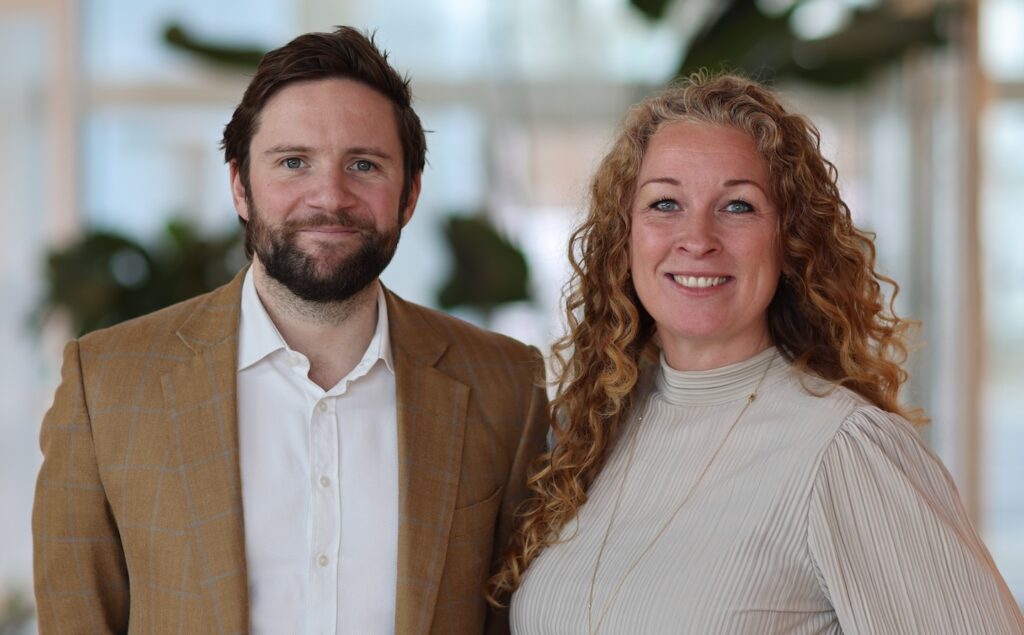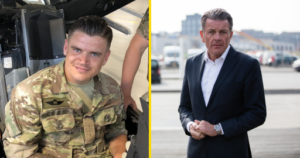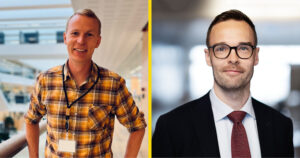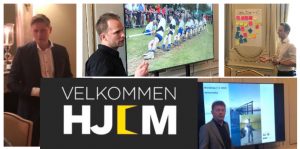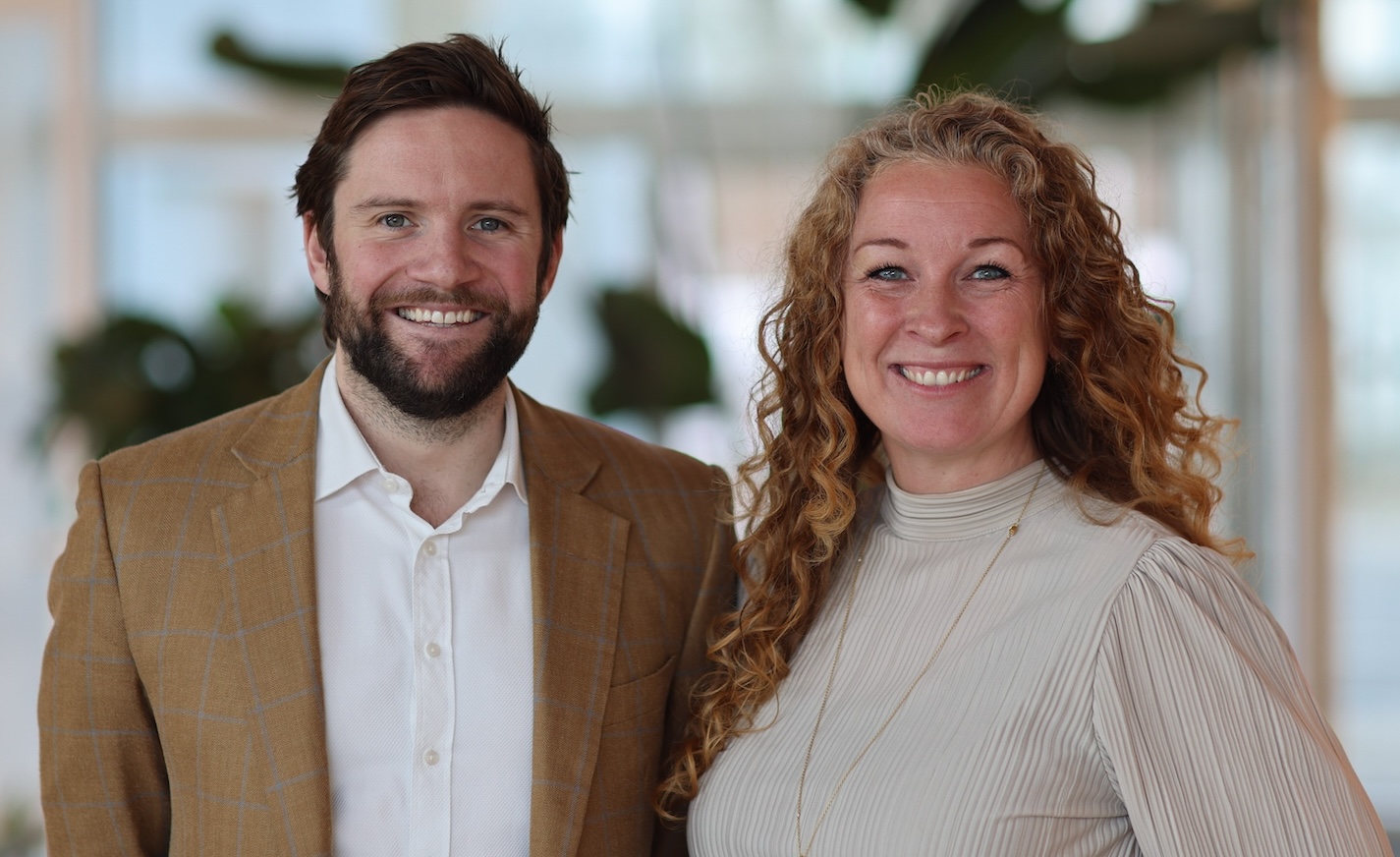
Was stuck in a loop of applying, receiving rejection, feeling disappointed and then back into the loop …
Udgivet d. 15. marts 2024 af Velkommen Hjem
Veteran Alasdair Pearson was selected to attend the Royal Military Academy Sandhurst – the centre of British Army leadership and then 10 fantastic years passed, during which he was deployed three times and gained good military training and a lot of experience. One day while he was training Libyan soldiers in the UK, Danish linguistic officers joined, and he met his future Danish wife. They settled down in Denmark, but life as a family man did not fit well with the working hours in the army. He left the Army and spent the next six months, applying civilians, without getting as much as one single interview. He felt he was stuck …until he met one of the dedicated mentors of VELKOMMEN HJEM, Pernille Fritz Vilhelmsen from Hempel A/S. From then on, things started to posting in a positive way …
– Several factors led me to the decision to leave the army. I enjoyed the work and the challenge but found an increasing tension between the home and work commitments. I felt torn, so I thought I could serve society in a way so that I could better manage the balance between work and private, says Alasdair, and continues:
– It has been a tough decision, but once made, I never doubted it. I think the final factor that gave us little choice was following the birth of our daughter; in her first 18 months, I spent a total of 13 months away – including a seven-month deployment with no return home due to C-19 restrictions. It was tough, and it was clear we could not make it work any longer.
The Army is great for developing yourself, and it is also an organisation that has provided me with great memories, friends for life and a defined period of service that I can always be proud of.
Veteran Alasdair Pearson
A huge lift to my spirits.
When Alasdair had decided to leave the Army, he immediately set about looking for a civilian job by himself in Denmark, but it turned out to be more difficult than he could have ever imagined.
– I spent roughly six months job searching and applying for jobs. On reflection, it was quite a tough time; I had applied for about 40 roles and was not called for a single interview. I discovered VELKOMMEN HJEM, and I was invited to submit a complete application, which was successful – it was the first time in six months I’d had anything back from any application. It was a huge lift to my spirits, says Alasdair.
Looking back, I can see things were not going well, and getting accepted into VELKOMMEN HJEM was a turning point in my mil/civ transition.
Veteran Alasdair Pearson
When was the last time you were happy?
Unfortunately, Alasdair could not attend kick-off – which the veterans, participating in VELKOMMEN HJEM, typically do – because he was still learning Danish. So instead he started directly in a mentoring with Pernille Fritz Vilhelmsen, Executive Vice President, Chief People & Culture Officer at Hempel A/S.
– VELKOMMEN HJEM has been very supportive throughout, and finding Pernille has been pivotal to my military/civilian transition into another country, he says and continues:
– Before we met for the first time, I had sent my CV and Cover Letter. As we met, we sat down for 90 minutes and discussed each other’s backgrounds. For the first time, someone drilled into me to find out why I had joined the Army and what exactly motivated me; we discussed my values and what periods of work and life I have been happy; we also delved into my inner cause behind joining the Army and why I ultimately left. With all these factors distilled in front of us we used these as guidance for identifying the next steps, Alasdair recalls, and he continues:
– I invested a lot of reflection time into this. The outcomes of our initial discussion helped pave the way for me to identify roles that I knew would fit my cause and purpose and what environment is likely to be a place that I will thrive in, which was critical to my job search. It also helped crystallise in my head why I joined the Army, why I left and what exactly I should be looking for as a result. This was an important process, and I was asked those exact questions as part of a future interview process. With Pernille’s help, I knew how to articulate my inner motivations and cause; I felt it led to a rapport with the interviewer – a veteran who shared the same feelings and we discussed at length life in and out of the military, well beyond our allotted interview time.
A mentor is someone in your corner to support, motivate, and inspire you, who will be there when you most need it.
Veteran Alasdair Pearson
Your CV is your key marketing tool.
Alasdair has found Pernille to be a guiding light during his process, and he was especially grateful for her impact on his CV and for her always being present in order to help him.
– On reflection, the transition can be a lonely process. I was stuck in a continuous loop of identifying roles in organisations I desired to work for; I would spend hours carving my CV appropriately, applying, receiving rejection, feeling disappointed and then back into the loop. It wasn’t until I shared my CV with Pernille, who questioned it, scrutinised it and dug into it, that I received proper feedback on my CV – my key marketing tool! Pernille made it clear that it did not reflect me (in no uncertain terms) – it was such a relief to hear it as if all the rejections were not exactly me getting rejected but my CV. For the first time, I felt like someone was in my corner. It was a huge uplift, and honestly, I now felt I was no longer in the trough but on the way up with someone there to guide me, provide support and help me be the best version of myself.
I commend Pernille for her energy, empathy, and commitment to positively impacting those around her.
Veteran Alasdair Pearson
We all need someone to believe in us
Alasdair Pearson is the third mentee, that Pernille Fritz Vilhelmsen has mentored through VELKOMMEN HJEM and according to her, “he will definitely not be my last”. She has chosen to spend time engaging herself as being a mentor for veterans in VELKOMMEN HJEM for several reasons.
– First, mentoring is very important to me. None of us in senior positions would be where we are today, if it had not been for someone who had taken us under their wings. Someone who spent their own time coaching us, challenging us, and indirectly created opportunities for us to grow and succeed. I certainly would not have achieved everything I have without amazing leaders or mentors who helped me uncover my strengths and opened my eyes to new opportunities. They believed in me, and sometimes that is enough for us to find our own strengths and build on that.
Also, I really love that I can still have direct positive impact on an individual basis. When you move up the organizational ladder, you often work on the more strategic parts of the business and have limited direct engagements on a one-to-one basis. I cherish having this opportunity personally, as it is infinitely rewarding, says Pernille Fritz Vilhelmsen and continues:
– Finally, I believe that being part of society in Denmark, with the values and beliefs that underpins our societal structure, we have an obligation to support those who fight for exactly that; a better world with promotion of democratic principles. And while conflicts are often multi-faceted, the military staff have a higher purpose that drives them, also when they go abroad. I think that investment should be rewarded, so that the rest of us, who do not invest ourselves directly in this, are ready to welcome them with open arms. We must be ready to help them use their amazing skills, also when they return and start looking for a different purpose in their work-lives.
Alasdair really strives to make a difference.
According to Pernille Fritz Vilhelmsen, the veterans generally acquire several skills in the military that are needed in the world of business:
– It has been very clear with all my mentees, and particularly Alasdair, that they have excellent planning and problem-solving skills. Where others get distracted by irrelevant information, politics, or details, most of the veterans simply seem to push for the right solutions that are practical, simple and effective. This is a critical skill in business life also. The perfectly laid out plan will have to be adjusted as soon as it meets reality, and this is something they are very skilled at. Also, being able to make decisions under pressure and focus on the task at hand, is something that I find that is simply part of their DNA, says Pernille Fritz Vilhelmsen, and elaborates on Alasdair in particular:
– What struck me with Alasdair immediately was his compassion and his eagerness to make a difference; being something to others and help others succeed beyond what they had imagined themselves. With the people under his leadership, he has done exactly what I did in our engagements: he sees the whole person and helps them understand how they can become the best version of themselves. And in his descriptions of how he would do this, it moved me to listen to a leader who would do so with respect for differences and backgrounds, religions, and upbringing, never letting this become an obstacle. Combined with his project management and planning skills, he is indeed a fine leader of people. I am quite sure that he will leverage those skills, also in indirect leadership and in the necessary ability in a business setting to manage stakeholders, even when you do not have direct authority over them. When he continues to let his core values guide him, he will be an absolute pleasure to both work for and with.
Make sure the interview represents YOU
Pernille Fritz Vilhelmsen chose to start the process with Alasdair by uncovering the inner landscape before the advice came to be about the practical elements of job search.
– Alasdair is excellent at self-reflection, so my “job” was actually quite easy. Instead of focusing on polishing his CV or translating technical skills, we started in a different place, which I believe is quite important. We started out uncovering what his true motivators are and where he thrives. I asked him to go through many examples of where he had been happy, successful, and felt he had made a difference while staying true to his values. We also talked about when his values had been compromised. I believe that starting here has meant that we have given him the language needed to present those values – and strengths – well in an interview setting. I did this, because I wanted a prospective employer to experience the PERSON in front of them and understand the value he could bring to the organization and the team. And only then did we start looking at what types of roles would suit him. Fortunately, there were a couple of roles posted early on already, and with a bit of help tightening up his CV and removing unnecessary “jargon” that doesn’t really tell them anything about him, instead replacing it with specific and to-the-point statements, he soon got called for two interviews where he ended up landing one of the roles, Pernille Fritz Vilhelmsen explain, and she continues:
– Once invited to the interview, we talked about what he could expect, and I made a point of drilling into him that he should be very crisp about each of the competencies they were looking for and be able to provide examples. So, he came prepared, not only to describe his skills, but also how he had applied them, what he had experienced when using the skills and finally what he would do differently now that he has had the learning from those situations. This is the best advice I can give – because the HR person interviewing will look for it! It is a simple recipe: Describe the situation; What did you do; Why did you do it; What was the outcome; What did you learn; What would you have done differently knowing what you know now after the experience. Always, always use specific examples so that the interview is about you – not generic skills that you cannot demonstrate with examples.
The good mentorship is to be continued …
For most mentors, the fact that the veteran ends up in a good job is the best part of the process. But Pernille Fritz Vilhelmsen also emphasizes the strength Alasdair has gained.
– Of course, it is that Alasdair has landed an amazing job in a fantastic company! But in addition to that, I think it is even more rewarding that I believe Alasdair, as a result of our sessions, has learned more about himself and has a greater confidence for it. He can face any situation now, knowing that he has someone he can discuss it with and who can help him make sense of it. And yes, we will of course continue our sessions as he begins in his new job, so that I can also help him navigate in his new working environment.
A dream role in a dream organisation – thanks to Pernille
Leaving the military and trying to find work can be daunting – and this is where the mentoring process and VELKOMMEN HJEM can become decisively important for the outcome for the veteran.
– It is hard to know where I would be without VELKOMMEN HJEM. For me, having a mentor helped hold up a mirror into myself, helped me understand who I was and what I wanted and drove my direction of travel, which I could translate to employers in interview rooms. In addition, it gave me invaluable moral support and a considerable amount of confidence, says Alasdair and ends:
– One day, an amazing opportunity in a great Danish organisation appeared; Pernille helped me sculpt the application, and I was called for an interview. Then followed a multi-stage interview process; thanks to Pernille and regular sparring, I got through the process, and I have just started a Project Management role in the Global Security Team at Novo Nordisk. It is a dream role in a dream organisation. I work for a great purpose in a great Danish organisation, doing a job where my experience and education are valued – you cannot ask for more than that.
The short soldier story of veteran Alasdair Pearson
- 2014 Op VOCATE: training of Libyan soldiers (in the UK). Danish linguistic officers joined us, and I met my future Danish wife.
- 2015 Op TOSCA: United Nations peacekeeping tour in Nicosia, Cyprus.
- 2020 Op TORAL: Kabul-based NATO stability operation at the initiation of the withdrawal from Afghanistan.
- 2021-22 Loan Service Advisor in Dhofar, Oman.
I grew up in the South East of England and was always interested in joining the Army. I intended to join straight from school, but teachers and family encouraged me to go to University and complete my studies before joining. I heeded the advice and, following successful results, I attended my first choice of University, the University of East Anglia, to read International Development. The fascinating course developed my awareness of geopolitical, developmental, and environmental issues worldwide and how they impact the most vulnerable. I completed my studies by leading a research project on the conservation of the One-horned Rhino in Nepal. During this experience, I lived with a local family and volunteered as an English teacher at a local school; I realised I wanted an exciting and international job that brought me close to people’s problems worldwide.
Upon completion of University, I questioned the next step for me; I even considered re-training to become a Lawyer. The British Army was always present as an idea, but I had reservations due to the impression of a complex/ structured life, and I wondered if I had the right minerals to flourish. I wanted to be challenged, to develop as an individual, and to get some ‘real life’ experience that I could be proud of. My reservations dissolved once a few close friends joined the Army, and hearing what they were doing appealed to me and sounded like the right next step. Following a few visits and officer aptitude tests, I was selected to attend the Royal Military Academy Sandhurst – the centre of British Army leadership.
I was commissioned into The Black Watch, The Royal Regiment of Scotland, a historic Scottish infantry regiment. I served in several roles, from Platoon Commander, Chief of Staff, Aide-de-Camp (to a 2* General), and Intelligence Officer. I also served as a seconded officer to the Royal Army of Oman, advising their operational brigade on the border with Yemen and Saudi Arabia. I was also fortunate enough to captain our regimental Nordic ski team for two winter seasons, competing in biathlon and cross/country skiing in Europe.
